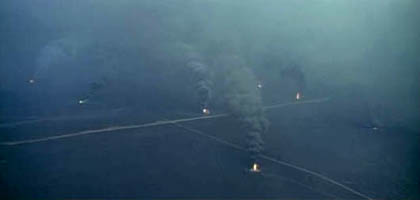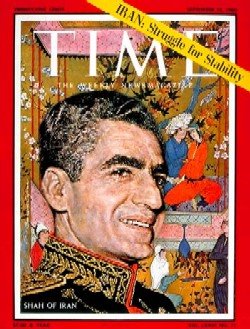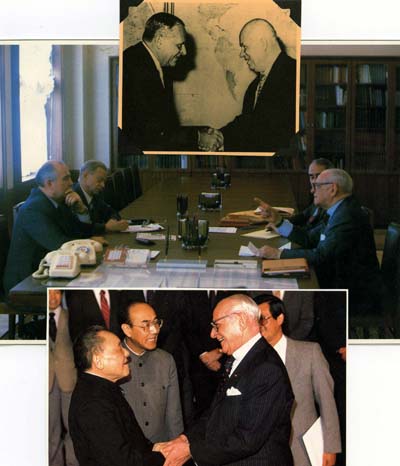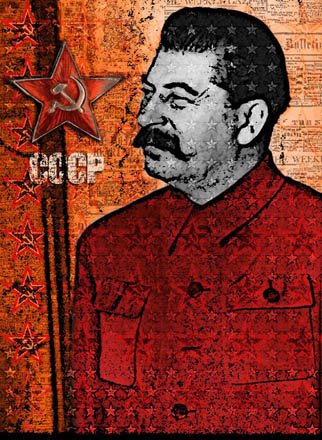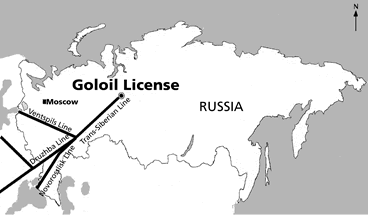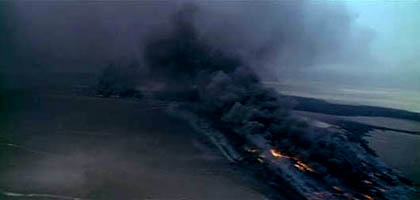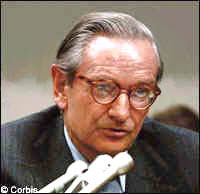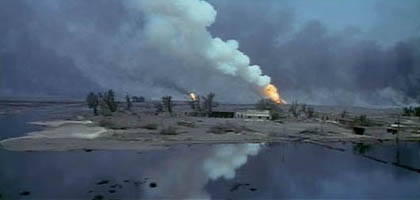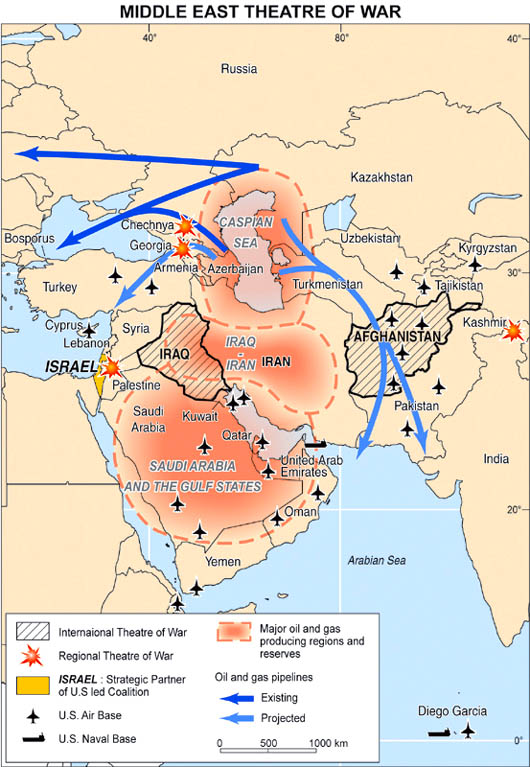Chapter 1 - Black Gold
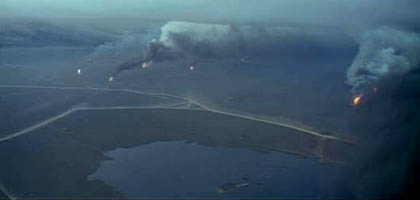
What is often called the German or Italian form of Fascism had its roots in America. Both Hitler and Mussolini were funded and brought into power in the 1920's and '30s by international bankers, including the 12 banks which now make up the American Federal Reserve System. But I get ahead of myself.
Beginning in the late 1800's, John D. Rockefeller , by means of a
deception, using a ploy with his Union Tanker Car Company
, by means of a
deception, using a ploy with his Union Tanker Car Company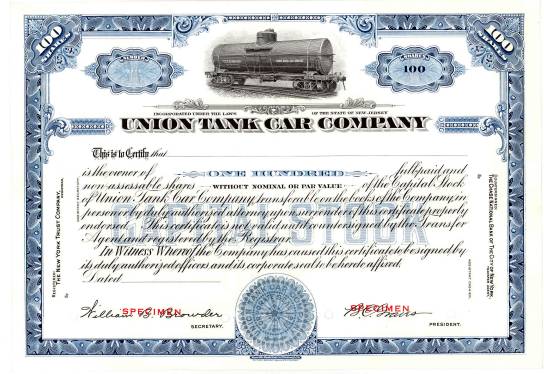 was able to
control or "corner" the oil market. In this scheme, he owned the company which had
the design patent for the
was able to
control or "corner" the oil market. In this scheme, he owned the company which had
the design patent for the
all-metal sealed oil
tanker railroad car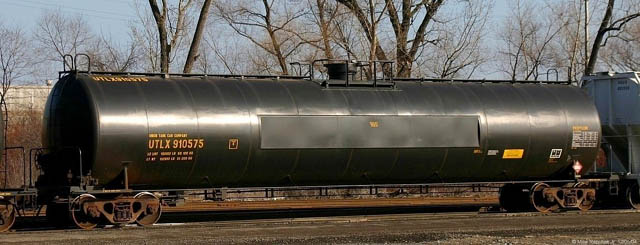 . The same type
of tanker cars are still in use today. Rockefeller, through Union Tanker Car,
leased tanker cars by the hundreds to the owners of newly discovered oil fields so
they could ship the crude to the refiners. This often included kickbacks from the
railroad for increasing the profitable traffic on their rails.
. The same type
of tanker cars are still in use today. Rockefeller, through Union Tanker Car,
leased tanker cars by the hundreds to the owners of newly discovered oil fields so
they could ship the crude to the refiners. This often included kickbacks from the
railroad for increasing the profitable traffic on their rails.
In the late 1800's, prior to the design of the tanker railroad car, petroleum was shipped to the refiner in open wooden barrels on flatbed cars. Some of the oil was lost as it sloshed out whenever the train stopped or started or went around corners. Much of the valuable part of the crude oil simply evaporated from the open barrels before it got to the refiner, often leaving only a heavy black tar. The wooden barrels were difficult and time consuming to fill and drain.
The closed metal tanker car was a boon to the new petroleum business. After several months of oil field development and shipments from the numerous wells being sunk in the ground, and after the refiner had built new facilities to handle the increased flow of crude, Union Tanker broke the lease and took back all of its tanker cars.
Since there was no other source for the tanker cars, both the oil field
developer and the refiner began to lose money caused by the instantaneous stoppage
of the oil flow from field to refinery. Within months the oil producer and the
refiner, after making large investments, were now on the verge of bankruptcy. Then
John Rockefeller, through his holding company, Standard Oil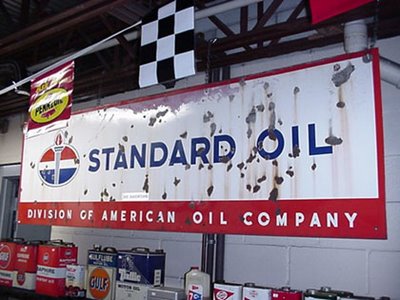 , simply walked
in and purchased both the oil fields and the refinery at pennies on the dollar. He
usually also ended up with the railroad in between.
, simply walked
in and purchased both the oil fields and the refinery at pennies on the dollar. He
usually also ended up with the railroad in between.
Despite his reputation as an oil magnate, John D himself was not really an oilman. He had little experience as either an oil driller or refiner. He simply leased oil tanker cars and made money buying oil fields and refineries at "distressed" prices. To run his oil fields and refineries, Rockefeller often hired the very same entrepreneurs whom he had just defrauded. They now worked for him. Only many decades later was it discovered who caused the "distress." And any Rockefeller today will point out, "...but it was not illegal."
In the period of 1900 to 1910 this conspiracy was repeated numerous times and Standard Oil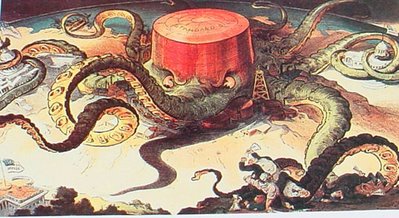 then owned
almost all the oil fields in California, Texas, Arkansas, New Jersey and Ohio, and
several other states. Thus John D. Rockefeller either owned or controlled about 90%
of what we now call the energy business. At that time, research shows, not many
people knew that Rockefeller owned the Union Tanker Car Company. Otherwise, very
few oilmen would have signed bogus leases for the cars if they had known that John
D. and Standard Oil owned all the tanker cars.
then owned
almost all the oil fields in California, Texas, Arkansas, New Jersey and Ohio, and
several other states. Thus John D. Rockefeller either owned or controlled about 90%
of what we now call the energy business. At that time, research shows, not many
people knew that Rockefeller owned the Union Tanker Car Company. Otherwise, very
few oilmen would have signed bogus leases for the cars if they had known that John
D. and Standard Oil owned all the tanker cars.
Many "muckraker" authors of the early 1900's, such as Ida Tarbell, exposed the predatory monopolist marketing practice of Standard Oil. But the Rockefeller connection with Union Tanker, and how Standard came into being, was not discovered until many decades later. And it still is not in the history books. And most of those few books which did show the connection between John Rockefeller and the Union Tanker Car Company have somehow mysteriously disappeared, but not all.
In 1911, the US government brought charges of monopoly against John D. and Standard Oil, and the company was broken apart. The many new companies all had names which were variations of the initials S.O., such as SOHIO in Ohio, SOCONY in New York, ESSO ("S.O.") which later became EXXON, etc. The splitting of the company was a mere inconvenience for Rockefeller. In retaliation, John D. made a vow. He vowed he would put his company back together. He also vowed in turn he would "break apart" the United States. He and his sons and grandsons and their companies have accomplished both. It was completed about 8 years ago. Again, I get ahead of myself.
In the period of 1910 to 1914 there were only three major oil companies in the
world, (1) Standard Oil in America and its many "mini-S.O.-standards" after the
1911 breakup, (2) the British-Persian Petroleum Company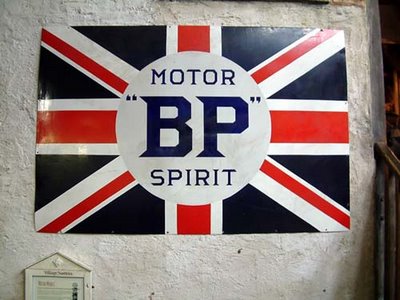 , which
controlled the large oilfields in Persia (now Iran), roughly extending up into
southern Russia, and (3) Royal Dutch Shell
, which
controlled the large oilfields in Persia (now Iran), roughly extending up into
southern Russia, and (3) Royal Dutch Shell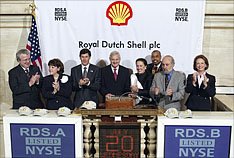 which controlled
the vast oil fields in the old Dutch East Indies Colonies in Indonesia and
southeast Asia. John D. resolved to take over control of both the British-Persian
Petroleum company and Royal Dutch Shell.
which controlled
the vast oil fields in the old Dutch East Indies Colonies in Indonesia and
southeast Asia. John D. resolved to take over control of both the British-Persian
Petroleum company and Royal Dutch Shell.
Rockefeller believed the world would be better served if all nasty corporate competition were eliminated. Then he could make the decisions to market petroleum like an efficient, smooth running, well oiled machine. It was simply a continuation of his business practice in the US for the previous 10 years. In several inter-corporate meetings around 1910 this was almost accomplished. He was distracted when the US government broke apart his oil holdings, but he was not deterred.
The big three oil companies agreed, instead, to act jointly as if they were one company, the first oil cartel. They settled on one world price for oil, which from 1910 to about 1975 was the world pegged price of "West Texas Sweet Crude." The law of "supply-and-demand" had been subverted. It was as if everyone bought their oil in Texas from Standard Oil regardless of from where in the world the oil came. They also agreed to divide up the world into three oil zones to match their local oil supplies and markets. To accomplish this they would need to eliminate or take over control of all other smaller local national ownerships of crude oil, or even the colonial ownership of any oil fields, such as in the old colonies of France, Germany, Spain and Portugal.
This was the purpose of World War I from 1914 to 1918, though few people
realized it. The elimination of most of the colonialism of the 1800's and the
carving up of the world was completed with the Treaty of Versailles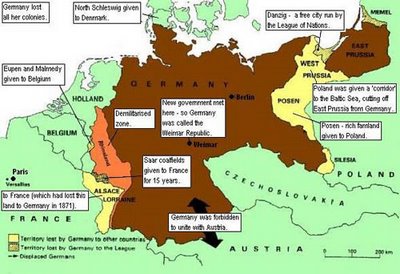 . The arbitrary
carving of the world into three primary areas is well documented in history books.
Until recently, whose hands were behind the carving had not been disclosed.
. The arbitrary
carving of the world into three primary areas is well documented in history books.
Until recently, whose hands were behind the carving had not been disclosed.
For Standard Oil to participate in the drawing up of the Treaty of Versailles, the United States would need to participate in WWI. Although the US entered the conflict belatedly and actually had a minimal affect on the outcome of the European war, the US was in on the negotiations and a signatory to the treaty. All went well, but, there was a fly in the ointment. In 1917, Russia did not go along with the plan to steal their huge oilfields. Russia had pulled out of WWI and did not participate in the Treaty of Versailles. The Bolsheviks, after several years of revolution, now had the world's largest supply of oil in southern Russia. Those vast oil fields were not under the control of either Standard, British Petroleum or Royal Dutch.
Prior to World War I, the most common use for petroleum was to make kerosene, a cheap replacement for the smelly whale oil or smoky coal oil in lamps for homes or businesses. Before the general use of electric light bulbs, kerosene was a product which was highly desirable, with a world-wide market. During WWI, it was discovered that petroleum could also be easily refined to make gasoline or diesel fuel for the internal combustion engines that were in the new airplanes, trucks, ships, submarines and tanks developed during the war.
Thus it became clear after 1918, ownership of oil was not only highly profitable but could now determine who won or lost a war. No longer would empires be built on, nor wars fought in the search for and conquest of gold. Gold had been superseded as the means to obtain political power. The internal combustion engine had replaced the war horse. In a period of only several years, a sudden shift in the geopolitics of the world had just occurred. And most people never noticed. He who has the most oil rules. Oil, black gold, became the fuel for the engines of war. A new world empire was about to be created. A new empire, not based on countries or nations, but of private corporations.
The arbitrary carving of the world into three pieces by the Big 3 oil companies in 1918, as determined by the Treaty of Versailles, was one of the reasons why Adolf Hitler wanted to get rid of the Jews. John D. Rockefeller, whose family name had originally been something like the Germanic Rogenfelder, was considered Jewish by most Europeans. Since Germany had just lost all its colonies with their oil fields under the arbitrary carving of national boundaries along oil market lines by the Versailles Treaty, Hitler blamed the "Jews" for all of Germany's problems. Hitler believed those whose hands had done the carving were all Jewish. That's right out of Hitler's book.
For John Rockefeller to overcome the problem of his oil holdings being broken apart by the US government in 1911, he created another stratagem even larger than the Union Tanker Car Company. He took his vast wealth and created 12 large holding banks we now know as the private Federal Reserve. The plot was to somehow sell his banks to the US Congress. He succeeded two years later in 1913.
All federal taxes collected since 1913 go through the private Federal Reserve System banks, whether they are gas taxes, import excise taxes or income taxes. You file your tax return with the Internal Revenue Service, but all the tax money withheld by your employer is sent to a Federal Reserve Bank. At the end of the fiscal year, the government IRS reports to the private Federal Reserve Banks how much income tax is reported on tax returns and then that amount should be transferred to the Federal government. The private Federal Reserve then pays that amount, but does not report or pay the interest earned on that money during the year. That is profit to the Federal Reserve Banks. This is now true of the so-called "central banks" of most nations, which were chartered along the same lines as the American Federal Reserve banks.
That is why they want you to "overpay" your taxes, and then at the end of the year, when you file your return with the IRS, you get back a refund, not from the Fed Banks, but with a check from the US Treasury. The private Fed earns interest on the amount you overpay, but the government Treasury loses the amount you get refunded. The private Federal Reserve pays no taxes and reports to no one. Thus, John Rockefeller and his heirs and assigns, have a cash flow each year equal to a good percentage of the American gross national product and that would be enough to buy out British Petroleum and Royal Dutch Shell, even if Standard Oil was broken into smaller pieces.
Thus financially armed, the very next year, Standard Oil, British Petroleum and
Royal Dutch set out to carve up the world into three markets in 1914, in what we
call World War I. But ended up with the lion's share of the world's oil still in
the hands of the Bolsheviks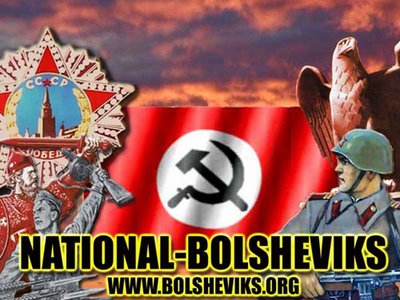 , later
ignominiously called "communists." The Socialists wanted the Russian state to
control the national resources such as oil, and not private profit making companies
like Standard, British Petroleum or Royal Dutch.
, later
ignominiously called "communists." The Socialists wanted the Russian state to
control the national resources such as oil, and not private profit making companies
like Standard, British Petroleum or Royal Dutch.
It would be hard for the Big 3 to corner and control the world oil market if the Russians still had the lion's share. To counter the Russian socialists, the Big 3 created and supported numerous "anti-communist" movements, which we now call Fascist. In Fascism, private profit-making corporations work hand-in-hand with governments, as opposed to Socialism where private companies are eliminated, and the country's resources and means of production are controlled by the government, usually a dictator, and the people. The profit from the sale of resources or goods produced goes to the people of the country, not some private corporation.
It was John D. Rockefeller who called the shots at the early Big 3 oil company meetings, even though he could not yet buy out his competitors, the British and the Dutch companies. Thus, as I said previously, Fascism, as a counter to Russian "communism," came right from the US. The Bolsheviks, Marxists and Leninists had long called themselves "socialists." The USSR was the Union of Soviet SOCIALIST Republics. They never called themselves "communists." It was John D. and the Big 3 who coined the word and branded them "communists." This was because the Russian Socialists held the oil fields as "community property" and did not allow private corporations like Standard to come in and privately own or steal the oil resources.
Fascism grew out of the attempt of the Big 3 oil companies to form a world cartel to control the world's supply of petroleum and eliminate any other competitors which they branded as "communists." Thus at the end of WWI, after the Treaty of Versailles, and the take over of the large oil fields in southern Russia by the socialists, came the creation of both "communism" and "fascism." Both were constructs, inventions and ploys of the Big 3: Standard Oil, British Petroleum and Royal Dutch Shell. It was a deception which would lead to world empire.
In the 1920's and '30s the Big 3 decided on a plan to eliminate Russian control of oil by "hiring" the small "fascist" movements in Germany and Japan to attack and take over Russia and thus eliminate any state control of oil fields. Most historians would blame large international bankers for funding the rise of fascism. But the bankers had no motivation and fringe fascists parties in Germany, Italy and Japan did not look like good financial risks. But for the Big 3 Oil companies there was a strong motivation to use the "fascists" to defeat the "communists" in Russia and take over the world oil market. And the vast oil wealth which they stored in their international banks provided them with the means. In the 1920's the opportunity was ripe.
Thus the small fascist political parties in Germany, Japan and Italy were given massive Big 3 financial backing to help those minor political parties come to power and build up their military. But things did not go quite as they had planned. The aging John D. had died and his son and four grandsons had decided they would carve up the world along different lines, and at the same time eliminate their competitors, the British and Dutch oil companies.
In 1939 and '40, the Germans did not attack Russia as the Big 3 had expected. Instead German General Rommel went rushing across north Africa to grab the Suez Canal and control all oil shipping through the canal. He then planned to continue on to Persia and toss out the British from the British-Persian oil fields. Also in 1939 the Japanese, after a short abortive attack on Russia in which they were driven out, instead went through southeast Asia and grabbed up all the oil holdings of Royal Dutch Shell. Most of those Royal Dutch fields at the end of the WWII came under the control of Standard Oil.
The British and Dutch companies probably knew in 1939 that their "fascist oil" plan to grab the fields in southern "communist" Russia had gone astray when both the Germans and the Japanese signed non-aggression pacts with Russia, and instead went after the Persian and East Indies oil fields. The grandsons of John D. were as sneaky and devious as their grandfather, but that's the competitive nature of the oil business in the new empire of energy.
The new Standard Oil plan was to have Germany and Japan attack and control Russia and its oil, along with the fields in Persia and Indonesia, then the US would attack and defeat Germany and Japan, thus leaving all the Russian oil in the hands of Standard Oil. And at the same time the holdings of British Petroleum and Royal Dutch Shell would then be taken from the Germans and Japanese, which would then also be controlled by Standard. And no one would be the wiser, since the British and Dutch fields would then just be the spoils of war.
When it became clear that neither the Japanese nor Germans "fascists" could complete the jobs for which they were "hired," the American people were tricked into supplying the man-power by entering WWII after the Pearl Harbor incident. In 1941, while nobody seems to have been watching, the Japanese had become a very powerful militaristic nation, well endowed with foreign funding from the Big 3, but they had no energy or oil supply of their own. They relied on the supply of oil for their new planes, ships, tanks and trucks coming from the Royal Dutch fields in nearby Indonesia.
In July 1941, President Roosevelt signed an embargo to stop all shipping to Japan, presumably in retaliation for the recent Japanese invasion of French Indo-china. The Roosevelts and the Rockefellers had long had friendly family ties. Roosevelt's US embargo cut off the Japanese oil supply, which would have quickly shut down Japan, with the obvious result. In late November 1941 the Japanese sent a written "war warning" through diplomatic channels to Washington, declaring the embargo should be stopped, or else many American sites in the Pacific would be attacked in retaliation. That formal diplomatic warning was ignored and the US sent back no reply. Just two weeks later the Japanese broke the embargo, by bombing the American embargo ships parked in Pearl Harbor.
It was no surprise attack. The Japanese had formally announced it two weeks before. It was only the obvious result of the American strangulation of the oil flow to Japan, and a clearly stated Japanese warning which had been received and ignored. The American public had been fooled into thinking it was a sneak surprise attack on Pearl Harbor. Since Franklin Roosevelt said so, it must be true. The Pacific war turned out to be a prolonged aircraft carrier war. Strangely, the US aircraft carriers in the Pacific Fleet had been sent on maneuvers just several days before the attack and none were in Pearl Harbor on Dec 7, 1941. Coincidence?
And it must also be by some strange logic, if Japan attacks the US, then the US also declares war on Germany. Unless, of course, there is some other larger plan afoot. The historical record shows Germany had not attacked nor engaged the US in conflict, so why did Roosevelt declare war on Germany in December 1941?
Records now show, that Hitler's plan had been to first capture the oilfields in Romania by 1939 so Germany would have its own supply of oil. This was accomplished. Then Rommel would capture the oilfields in Persia by 1941, then capture the oilfields in Russia in 1942, and only then would Hitler have sufficient fuel for prosecuting a war with the United States. But the Japanese, on December 11, 1941, less than a week after the Pearl Harbor incident, convinced Hitler to also declare war on the United States. Hitler agreed only if the Japanese would attack Russia, since the fascists were now bogged down in Russia and Hitler would be helped if the Russians had to defend themselves from Japan. But the Japanese did not attack Russia. Hitler was driven out of Russia and now was without a fuel source. Was this the war plan of the new Empire of Energy?
The Romanian oilfields in Ploesti were insufficient for Germany to carry on a war on two fronts. With American assistance going to Stalin to protect his southern Russian oilfields and with Rommel stopped in Africa so he could not reach the Persian oilfields, it was only a matter of time until Germany's war engines would run out of fuel. By the time of the Allied invasion of Europe on June 6, 1944, Germany was running on fumes. The last major German attack against the Allied invasion force was the Battle of the Bulge. Hitler had intended for Rommel to attack the invading allies with his tanks, then capture the fuel dumps which the allies had amassed. This would stop the American and British forces, and obtain needed fuel.
But when German General Rommel got to the fuel dumps he found American General Eisenhower had ordered them burned. No, the Allies did not win the Battle of the Bulge. It was Rommel and Hitler who lost. Rommel's panzer tanks simply ran out of gas. The German army abandoned their tanks right where they had quit. After that it was a rather swift footrace with the Allies chasing the Germans in a fast retreat back to Berlin. Is there something wrong with this picture? Yes. Its not the one you were taught in school. You were taught the story about the horrors of "fascism" and "communism" but you weren't taught about how black gold had now become the motive and the means for war. He who owns the oil rules. World War II was a demonstration of both, and the new power of the Empire of Energy.
So the Japanese, the Germans and even the Americans were deceived into fighting the "enemy." But in fact, at the end of the war in 1945, it was Standard Oil who won the war in the Pacific and had taken control of most of the oil fields in the Pacific area from Royal Dutch Shell. All that was left was to acquire the oil fields in Persia and Russia. The new Empire of Energy was just scant years away from complete world domination.
Disclaimer
posted by Chazzsongs at
5/19/2006
|
0 comment(s)
![]()


